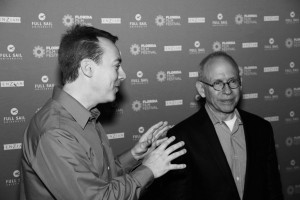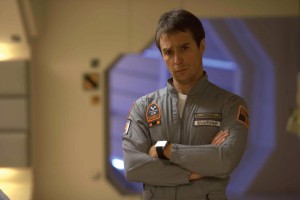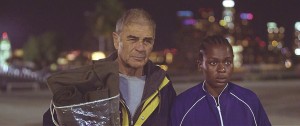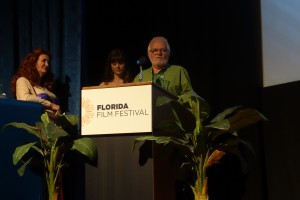Rockwell, Balaban headline ’15 Florida FF
From The Orlando Weekly, March-April, 2015Actors Sam Rockwell and Bob Balaban will headline the 24th annual Florida Film Festival, which will run April 10-19, 2015. Rockwell will attend a showing of Duncan Jones’s Moon (in 35mm) on April 17, and Bob Balaban will screen Robert Altman’s Gosford Park, which he co-produced, on April 12. Both will participate in Q&A’s after each film. (To watch my interview with Rockwell, click here. To see my Balaban interview, visit YouTube.)
Only two celebrity events are scheduled this year, to allow a greater variety of programming, or perhaps in a nod to the difficulty of securing topnotch talent, thanks to festival proliferation. The “Afternoon With” is being scrapped but may return in 2016, according to Programming Director Matthew Curtis.
Another change is the elimination of Italian night. But fans of French cinema might actually embrace that revision, as a 50th-anniversary digital restoration of Jean-Luc Godard’s Alphaville will be shown instead, as the closing-night film.
The festival will include 177 movies (57 features and 120 shorts), selected from about 1,600 submissions. As usual, films will play at the Enzian Theater in Maitland and on two screens at Regal Cinemas at Winter Park Village in Winter Park. Attendance is expected to be between 20,000 and 25,000, according to Curtis.
“It’s a little bigger than it’s ever been as far as the film count goes,” Curtis says. “The films in the festival represent 30 countries, and one of the things we’re proud of is we’ve got some countries represented that are not usually in the festival, certainly not for features, including Ukraine and Turkey. … We’ve got more free outdoors movies this year. We’ve got more family films this year.”
Categories include competition films, spotlight films (movies that have already received distribution deals), international showcase, family films (such as Monkey Kingdom and Top Spin), midnight movies (such as The Editor and Alleluia), food films (such as Grazers: A Cooperative Story and The Search for General Tso), music films (such as The Case of the Three-Sided Dream and Billy Mize and the Bakersfield Sound) and Florida films.
The opening-night film will be Welcome to Me, a comedy directed by Shira Piven and starring Kristen Wiig, Tim Robbins, Joan Cusack, Jennifer Jason Leigh and James Marsden. It will be preceded by the North American premiere of the stop-motion Submarine Sandwich. Tickets to the film are $25, but if you’d like to combine that with a ticket to the opening-night party, that’ll set you back $110.
The festival will include 22 world premieres (compared to 18 last year) and 150 Florida premieres. Of the 57 features, 22 are documentaries.
Of interest to music fans will be the four main shorts programs, which are named for Everly Brothers songs, to honor Phil Everly, who died last year. But the shorts aren’t confined to just four blocks, as the international, animated, international animated and documentary blocks often have some stellar material, as does the annual “Best of Brouhaha,” which I had the privilege of helping jury for the third year in a row. (It features some of the best student and lower-budget flicks from around Florida.)
Outdoor screenings have always been a big part of the festival, and this year is no exception. The first outdoor movie will be (500) Days of Summer, April 13 on the Enzian lawn. That will be followed on April 14 by a 50th-anniversary showing of Elvis Presley’s Girl Happy in Winter Park’s Central Park. The last two, both scheduled for the Enzian lawn, will be Donnie Darko on April 15 and Amelie on April 16. All outdoor films are free and begin around 8 p.m.
Discussions are plentiful as well. “Film in Florida” will take place at the Enzian on April 15 from 11 a.m. to 12:30 p.m.; “Florida Film Mixer” will be held at Eden Bar on April 15 from 12:30 to 1:30 p.m.; “Making Meaning: Films that Change the World” is scheduled for April 16, from 11 a.m. to 12:30 p.m. at Enzian; “Across the Pond: American Screenwriters, British Madmen” will be held at the Enzian on April 17 from 11 a.m. to 12:30 p.m.; and “Filmmaker Forum” will take place at Regal Winter Park Village on April 17 from 2 to 3:30 p.m. All five events are free.
What’s not free are the Filmmaker Welcome Party on April 16, the Industry Party on April 17, and the Filmmaker Awards Ceremony & Bash on April 18, all of which are either ticketed events or invite-only. However, the Festival Block Party at Winter Park Village on April 12 and the Florida Film Mixer at Eden Bar on April 15 are complimentary and open to everyone.
As always, one of the big draws are the filmmakers themselves, who often participate in Q&As after their films. And just because there are only two celebrity events this year, that doesn’t mean you shouldn’t be on the lookout for minor stars. For instance, producer Matty Simmons will be attending the closing weekend in conjunction with the documentary Drunk Stoned Brilliant Dead: The Story of the National Lampoon.
Ticket packages range from $99 for all matinee films to $350 for a 10-day pass. But if you’re particularly ambitious (or rich), there are the “film lover pass” for $600 and the “producer pass” for $1,500, which allow special access to press screenings and parties. Individual tickets are $11 for films after 5 p.m. and $9 for matinees.
With all those details out of the way, what films do I recommend? Check out the list below, organized from best to worst. Or to see the reviews in their original form, visit www.orlandoweekly.com and www.orlandoweekly.com. Also click here for some short reviews of the movies I enjoyed at advance screenings and here to see my short preview film. And for the full schedule and movie lists, visit Florida Film Festival.
Moon, 2009, 4 ¼ stars
Directed and co-written by British filmmaker Duncan Jones in 2009, Moon focuses on the psychological struggles of Sam Bell, an astronaut on a years-long solitary mission to mine the Moon for nuclear-fusion fuel. But in the grand tradition of Andrei Tarkovsky’s Solaris and Stanley Kubrick’s 2001: A Space Odyssey, nothing is quite what it seems in space, both mentally and physically.
The movie stars Sam Rockwell, and the actor will be attending the special screening at the Enzian on April 17 and participating in a Q&A afterwards. Though tickets are already on stand-by, it might be worth showing up early and trying your luck, as the chance to see this smart sci-fi film and listen to Rockwell is just too irresistible.
Damla and Kevin are New York newlyweds expecting a baby she doesn’t seem to want. Hoping to better understand her wife’s upbringing in Turkey, Kevin proposes a trip to the Aegean Sea resort where Damla spent her childhood summers. What he doesn’t anticipate are the ghosts of an old relationship, which may doom their future.
Kumiko, the Treasure Hunter FL, 2014, 4 stars
As an unmarried, misunderstood 29-year-old office worker in Tokyo, Kumiko (the extraordinary Rinko Kikuchi) leads a depressing, lonely life, eschewing everything and everyone except her pet rabbit, Bunzo. Her only joy is her delusional obsession with the movie Fargo, which she perceives as real and, therefore, assumes that the money Steve Buscemi’s character buries in the snow is ripe for her plucking, if only she can traverse the 5,000 miles that separate her from the treasure.
 “I am like a Spanish conquistador,” she says. “Recently I’ve learned of untold riches hidden deep in the Americas. Long ago, Spanish conquistadors learned of such things from American Indians. Now I have learned from an American motion picture.”
“I am like a Spanish conquistador,” she says. “Recently I’ve learned of untold riches hidden deep in the Americas. Long ago, Spanish conquistadors learned of such things from American Indians. Now I have learned from an American motion picture.”
Kumiko, the Treasure Hunter could have been a ridiculous comedy substituting spoof for heart, but in the mature hands of David and Nathan Zellner – and executive producer Alexander Payne – it becomes a haunting homage to the Coen brothers and to every troubled soul who has been cinematically inspired to dream an impossible dream.
Limited Partnership, 2014, 3 ¾ stars
There may be no nobler way to live your life than to dedicate it to a cause greater than yourself, especially when that cause is forged from love, equality and justice. And that’s exactly what Filipino-American Richard Adams and Australian Tony Sullivan have done during their 40-year-old trailblazing struggle for gay rights and marriage equality.
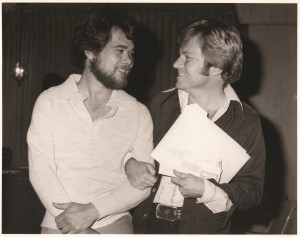 Limited Partnership, directed by Thomas Miller, begins like many other documentaries that have chronicled similar struggles, with flashbacks and flash-forwards, interviews with friends and family, and historical highlights of the war for sexual-orientation equality. But thanks to Miller’s mature storytelling, years’ worth of powerfully personal interviews with Adams and Sullivan, and a bit of cinematic luck, we’re able to empathize not just with the on-screen subjects but with all people who have fought to have their marriages and, indeed, their self-worth recognized by the government of the United States. I’ve simply never seen a better documentary about same-sex marriage.
Limited Partnership, directed by Thomas Miller, begins like many other documentaries that have chronicled similar struggles, with flashbacks and flash-forwards, interviews with friends and family, and historical highlights of the war for sexual-orientation equality. But thanks to Miller’s mature storytelling, years’ worth of powerfully personal interviews with Adams and Sullivan, and a bit of cinematic luck, we’re able to empathize not just with the on-screen subjects but with all people who have fought to have their marriages and, indeed, their self-worth recognized by the government of the United States. I’ve simply never seen a better documentary about same-sex marriage.
Preceding Limited Partnership is the short doc Sandorkraut (3 stars), about revered food author and fermentation expert Sandor Katz. Though the short and feature are vastly different in subject, they are well matched thanks to their embrace of men with unquenchable passions for their loves and beliefs.
Once Upon a Crime: The Borrelli-Davis Conspiracy, 2015, 3 ¾ stars
“Seven years ago, I set out to tell a story involving crooked cops, a mafia godfather, murder, poisonings, Elvis Presley, prison gang leaders and a coke-addicted newspaper editor,” writer-director Sheldon Wilson tells us. “Who would have thought that that was just the beginning of the story?”
OK, so Wilson’s documentary, Once Upon a Crime: The Borrelli-Davis Conspiracy, has virtually nothing to do with Elvis, cocaine or poison, but the facts of the real story are actually more fascinating.
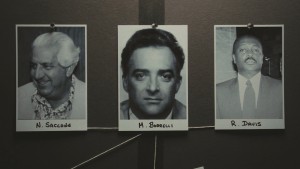 Retired New York policeman Mike Borelli and his friend and former cop Bob Davis were falsely accused in 1975 of the murder of a man Borelli worked with. It mattered little that there was no evidence tying them to the crime, they weren’t in the city at the time and Davis didn’t even know the victim. The police simply wanted a conviction.
Retired New York policeman Mike Borelli and his friend and former cop Bob Davis were falsely accused in 1975 of the murder of a man Borelli worked with. It mattered little that there was no evidence tying them to the crime, they weren’t in the city at the time and Davis didn’t even know the victim. The police simply wanted a conviction.
Wilson doesn’t exactly uncover a unique smoking gun to explain the case these 40 years later, but through emotional interviews with most of the participants, non-obtrusive re-enactments and a careful presentation of the facts, he forges an intriguing marriage of solid journalism and thrilling entertainment that’s on par with some of Errol Morris’s best work.
Playing before the feature is the documentary short Mr. Gold (2 stars), which won’t mean much to non-locals but will grab the interest of Orlando residents who have seen the unique sign holder tipping his hat and waving to passersby on Colonial Drive.
The Cult of JT LeRoy, 2015, 3 ½ stars
Teen literary sensation JT LeRoy burned bright, but not very long. After a meteoric rise, this fire of “transgressive fiction” was extinguished in 2006 at the age of 26. But he never truly died because he never really lived, and if you don’t already LeRoy’s weird tale, that’s the only spoiler you’ll get here.
Directed by Marjorie Sturm, The Cult of JT LeRoy doesn’t break much new journalistic ground. (Credit The New York Times with that.) But it does present Leroy’s life in a unique, revelatory way, complete with original interviews and an appropriately uncomfortable examination of the pretentious bullshit that accompanies fandom and fame.
Once Sturm reveals the twist behind the “extraordinary found object” that is LeRoy, the documentary loses steam, as does a narrative fiction piece that has just lost its protagonist. But then it carefully navigates those difficult storytelling waters, managing to switch audience sympathies – or hatred – onto another player who is accurately described as “one of the craziest motherfuckers ever.”
(It’s just too bad this worthwhile feature is preceded by Everything That Smiles Back (0 stars), a rambling, pointless, badly shot short doc about an eccentric trailer-park resident. I guess just about everything is film fodder these days.)
Gosford Park, 2001, 3 ¼ stars
No director dealt with multiple stars and storylines like Robert Altman. His skill at juggling and ultimately merging myriad plots and characters into a single, emotionally profound experience is legendary. From his masterpiece, Nashville, to classics such as Short Cuts, The Player and M.A.S.H., down to underappreciated gems like Popeye and A Prairie Home Companion, Altman left an indelible mark on cinema.
Regrettably, Gosford Park is not among the master’s top-tier work. For most other directors, that would mean a thumbs-down review, but not for Altman, as the 2001 British mystery starring everyone from Maggie Smith to Clive Owen to Helen Mirren has energy, charm and intelligence. It just doesn’t crackle quite like Altman’s best work, perhaps because it needed a director with more of a British sensibility, to match that of writer Julian Fellowes (of Downton Abbey fame).
Veteran character actor Bob Balaban co-produced Gosford Park and also plays, appropriately, American film producer Morris Weissman, so it’s no surprise he chose the film for his April 12 “Evening With” event, at which he will participate in a Q&A. (But if you’re like me, you’ll want to ask the legendary character actor about his roles in Seinfeld and Close Encounters of the Third Kind – and why he never seems to age.)
I Am a Knife with Legs, 2014, 3 ¼ stars
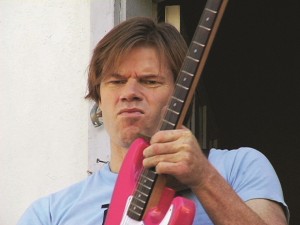 What is this monstrous mound of low-budget primitive absurdism called I am a Knife with Legs? It’s part-animated, part-musical, part – wait, what is this thing with letters and numbers I’m typing on? It’s not really a typewriter and it’s not really a keyboard. It’s weird. I digress.
What is this monstrous mound of low-budget primitive absurdism called I am a Knife with Legs? It’s part-animated, part-musical, part – wait, what is this thing with letters and numbers I’m typing on? It’s not really a typewriter and it’s not really a keyboard. It’s weird. I digress.
So, “I’m a knife with legs and special pants and a cat with a bag of eggs,” pop superstar Bené (writer-director-musician Bennett Jones) sings to us amid halfhearted jump cuts, dream sequences, music videos, and intentionally bad mixes of looping and live sound. He’s struggling to get over the death of his girlfriend Baguette at the hands of a suicide bomber while dodging a random fatwa. Yet he still finds time to croon such classics as “Changes Make Things Different,” “Sexy Love” and “All Religion is Stupid, Especially Yours.”
Accompanying Bené is his “manager/security/DJ/foil character/drinking buddy” Beefy (Will Crest) who, in a metaphor for the film, asks his abhole-shirt-wearing, Tommy Wiseau-acting friend, “Where are we going with this?” The answer: absolutely nowhere. Yet if you love folk-art cinema, long for an even-lower-budget Borat or have recently been beaten severely about the head and face with a custard-filled éclair while watching Harrison Ford fend off a bear and converse with a tiny Frankenstein’s monster, see this movie. Because movie.
To watch my short film of Jones’s performance at the festival, click here.
Gemma Bovery FL, 2014, 3 stars
“Desire and death are intertwined,” we’re told in Gemma Bovery, a clever and occasionally funny satire on Gustave Flaubert’s masterpiece. Though director Anne Fontaine’s French-language production is essentially a one-note conceit, it’s able to coast on its charm, overcoming its almost total lack of a second act and other story deficiencies.
 With just two letters separating her name from that of the doomed heroine in Madame Bovary, Gemma (the painfully gorgeous Gemma Arterton) is a married Englishwoman fresh to France, with a life that eerily resembles that of her literary shadow. Or at least that’s what her elderly male neighbor (the excellent Fabrice Luchini) imagines thanks to his obsession with the 19th-century novel.
With just two letters separating her name from that of the doomed heroine in Madame Bovary, Gemma (the painfully gorgeous Gemma Arterton) is a married Englishwoman fresh to France, with a life that eerily resembles that of her literary shadow. Or at least that’s what her elderly male neighbor (the excellent Fabrice Luchini) imagines thanks to his obsession with the 19th-century novel.
“Gemma, there’s a moment when life imitates art,” he tells her. Though she doesn’t see the connection, she is at least compelled to read the Flaubert book and, amusingly, comment, “Nothing happens, but at the same time it’s interesting.”
The same could be said of the film, which gets bogged down in affairs between a woman we barely know and suitors we care nothing about. It also becomes needlessly preoccupied with a time-consuming subplot involving a cracked porcelain figure, perhaps a metaphor for Gemma’s damaged marriage to her husband (Jason Flemyng, well known for playing Thomas Button in The Curious Case of Benjamin Button). But like that statue, the movie feels a bit broken until it rights itself with a solid ending that balances drama, comedy and literary homage.
Top Spin, 2015, 3 stars
 As an amateur ping-pong player, I didn’t need Top Spin to tell me that the sport is perceived as a bit of a joke in this country. But it was still refreshing to hear Americans talk about their love for the game and see, in edge-of-your-seat cinematography, just how beautiful, stressful and even lonely table tennis can be.
As an amateur ping-pong player, I didn’t need Top Spin to tell me that the sport is perceived as a bit of a joke in this country. But it was still refreshing to hear Americans talk about their love for the game and see, in edge-of-your-seat cinematography, just how beautiful, stressful and even lonely table tennis can be.
But, as with countless other sports documentaries, you need not love the sport to appreciate the sacrifices its participants make in pursuit of their dream. Case in point: Michael, Ariel and Lily, three high school students struggling to balance their personal lives with their athletic passion while inching toward their ultimate goal: the 2012 London Olympics.
 Though the three teenagers’ struggles are emotionally moving, their personal battles seem just a bit too much like First World problems to create heartrending empathy. Top Spin, directed by Sara Newens and Mina Son, is better, therefore, when it focuses less on its interviews (only some of which are effective), turns down its overactive musical score and concentrates on the sport itself. And once it starts to do that – by immersing you in the drama of back-spinners, choppers and top-spinners all ferociously battling for just three North American Olympic slots – don’t be surprised if you end up more emotionally involved than you expected.
Though the three teenagers’ struggles are emotionally moving, their personal battles seem just a bit too much like First World problems to create heartrending empathy. Top Spin, directed by Sara Newens and Mina Son, is better, therefore, when it focuses less on its interviews (only some of which are effective), turns down its overactive musical score and concentrates on the sport itself. And once it starts to do that – by immersing you in the drama of back-spinners, choppers and top-spinners all ferociously battling for just three North American Olympic slots – don’t be surprised if you end up more emotionally involved than you expected.
“Table tennis is evolving,” we’re told. “It’s coming out of the basements and garages.” And Top Spin deserves some credit for that evolution.
Aspie Seeks Love, 2015, 2 ¾ stars
David Matthews is 46 years old, lives outside Pittsburgh, is perpetually single despite his mildly successful writing career, and, oh, he has Asperger’s. If that last tidbit sounds like a casual add-on, it sort of is, as he wasn’t diagnosed with the highly functioning form of autism until he was 41, despite years of social awkwardness and odd behavior that included posting flyers on trees and buildings advertising his interest in dating women.
“I really do want to share my creative output with the world,” he says, “but, on the other hand, I feel self-conscious about presenting myself.”
Those feelings are normal for David and others who suffer from the same neurological condition, but instead of presenting a figure isolated from the world, Aspie Seeks Love, an ambitious, multi-year documentary project from director Julie Sokolow, reminds us that we’re all quirky and unbalanced in our own unique way.
Shot amateurishly and too reliant on the everyday events and chatter of David’s life, Aspie is still a sweet and startlingly intimate examination of one man’s quest for companionship and acceptance. The doc struggles to find a style to fit the quirkiness of its subject – Crumb it is not – but it ultimately succeeds by honestly embracing its odd humanity.
Sunshine Superman, 2015, 2 ¼ stars
“People like that have something inside, something to do with death.”
Those words spoken by Cheyenne (Jason Robards) in the immortal Once Upon a Time in the West ring true for Carl Boenish, who went from engineer, to skydiver, to filmmaker, to cliff jumper before essentially founding the BASE jumping movement in the late 1970s. But they also belie the seemingly happy daredevil’s lust for life and his spiritual desire to abandon all rules of man for the rules of nature.
 Sunshine Superman, a documentary of the thrill-seeker’s life, shows Boenish and his wife, Jean, in an exceedingly positive light. Through reenactments, interviews with family and friends, and abundant clips of Boenish’s adventures, director Marah Strauch fashions a documentary fitting its subject. But, regrettably, the doc, like so many others that get just a bit too close to their subjects, falls victim to reverence while neither challenging us nor breaking much storytelling ground.
Sunshine Superman, a documentary of the thrill-seeker’s life, shows Boenish and his wife, Jean, in an exceedingly positive light. Through reenactments, interviews with family and friends, and abundant clips of Boenish’s adventures, director Marah Strauch fashions a documentary fitting its subject. But, regrettably, the doc, like so many others that get just a bit too close to their subjects, falls victim to reverence while neither challenging us nor breaking much storytelling ground.
Yes, the soaring cinematography is spectacular and can almost convince you to follow in the footsteps of the Boenishes and their fellow daredevils. But then the music kicks in, the reenactments sap the realism and the interviewees become a tad preachy, and we’re left with a production that, though competent, isn’t weighty enough.
If you’re a fan of extreme sports, particularly BASE jumping, this is a must-see. If you’re not, you may still appreciate the film on a visual level and empathize with its characters, but your time would be better served by choosing Limited Partnership, Once Upon a Crime: The Borelli-Davis Conspiracy, The Cult of JT LeRoy, Top Spin or another one of the stronger documentaries at this year’s festival.
The 100-Year-Old Man Who Climbed Out the Window and Disappeared, 2013, 2 ¼ stars (not reviewed)
Gabriel, 2014, 2 stars (not reviewed)
My Life in China, 2015, 2 stars
Cinema is overflowing with immigrant stories. Indeed, those famous words by Emma Lazarus inviting the world’s tired, poor, huddled masses to America practically read like a movie premise.
Joining the genre is My Life in China, a documentary by Kenneth Eng about his father’s defection to the United States in 1966 and their recent return to the family’s native village. But instead of reinforcing the idea of the American Dream, this Cantonese film turns that dream upside down and instead seems to seek an addendum to Lazarus’s poem: profound regret.
“If I could choose all over again, I would choose to stay in China – better than in America,” Eng’s father says. “Because nowadays, when I’m in China, there’s freedom to make money. Nobody tries to stop you. … [But back then] I needed to find a way to help my family.”
Despite a strong ending, genuine moments of emotional discovery and eye-opening truths about the changing conditions in China and the United States, Eng’s film, at just 53 minutes, feels underdeveloped and only a step or two above an impromptu handheld-camera travelogue. When combined with the 28-minute Vietnamese documentary War Within the Walls, about a group of disabled children living with the effects of Agent Orange, My Life in China could be a worthwhile watch. But judged as a stand-alone feature, it comes up just short.
The Editor, 2014, 2 stars (not reviewed)
My Last Year with the Nuns, 2014, 1 ¾ stars
My Last Year with the Nuns isn’t really a documentary and certainly isn’t narrative fiction. It exists in that twilight between genres, borrowing from such “essay films” as Orson Welles’ F for Fake and from TV shows and movies that were based on stand-up material, such as Seinfeld and Mike Birbiglia’s Sleepwalk with Me.
 A filmed version of monologist and storyteller Matt Smith’s live show, this walk down memory lane is a re-creation of Smith’s life as a 13-year-old boy in Seattle during the racially, sexually and culturally complex 1960s. Directed competently by first-timer Bret Fetzer, divided into nine chapters and performed entirely by Smith, the movie meditates on such typical adolescent activities as disrupting Mass, smoking, shoplifting, hocking loogies at nuns, discovering stashes of nudie magazines, stealing money from the collection plate, sticking your dick through knotholes, burning said dick with a lit cigarette, street fighting and “queer-bashing.” Ah, boyhood.
A filmed version of monologist and storyteller Matt Smith’s live show, this walk down memory lane is a re-creation of Smith’s life as a 13-year-old boy in Seattle during the racially, sexually and culturally complex 1960s. Directed competently by first-timer Bret Fetzer, divided into nine chapters and performed entirely by Smith, the movie meditates on such typical adolescent activities as disrupting Mass, smoking, shoplifting, hocking loogies at nuns, discovering stashes of nudie magazines, stealing money from the collection plate, sticking your dick through knotholes, burning said dick with a lit cigarette, street fighting and “queer-bashing.” Ah, boyhood.
I wish I could say that my disappointment with this movie stems from my desire to see it live instead of on film, but, regrettably, it’s the material I found tedious. Though Smith is likeable and weaves amusing yarns that those who grew up Catholic might enjoy, he’s essentially a poor (and crude) man’s Garrison Keillor, offering us little meaningful nostalgia, little magic and little wisdom to accompany his endless tales of amateur depravity.
The Desk, 2015, 1 ¾ stars
Pretend you’re a fair-minded, professional journalist, as the creator and subject of The Desk (2 stars) imagines himself. A writer comes to you to pitch a piece after uncovering scandalous information that may or may not prove that a person was unjustly let go from his job. “Ah, sounds like an interesting read. So who is this wronged person?” you ask.
“Me,” the writer answers.
Stunned that the guy would dare approach you about a piece that is so clearly fraught with conflict of interest, undue emotional attachment and just plain motivation for revenge, you somehow muster up a “no thanks” while trying to hide your distaste for his ethical lapse. You send him on his way.
Former New York Times columnist Andrew Goldman is essentially that writer, bringing us a fatally flawed, if somewhat unique and entertaining, blend of documentary, essay and half-fictional narrative. During his 90-minute rant, he doesn’t exactly create a bad movie, but he does commit the same crime he condemns his former employer for: bad journalism. And he too should be sent on his way.
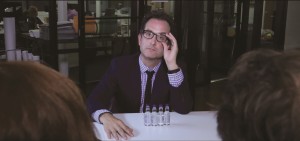 Goldman used to be a talented Times columnist, specializing in provocative and often insightful interviews with celebrities. He first got in trouble – with both his employer and politically correct social-media nut jobs – when he asked Tippi Hedren a blunt question in the wake of the movie The Girl. He pondered aloud why Hedren didn’t give in and have sex with Alfred Hitchcock to help her career. He was immediately – and falsely – branded a misogynist. Though he wasn’t fired, he was given a punishment harsher than the Times gave a known plagiarist, a one-month forced leave.
Goldman used to be a talented Times columnist, specializing in provocative and often insightful interviews with celebrities. He first got in trouble – with both his employer and politically correct social-media nut jobs – when he asked Tippi Hedren a blunt question in the wake of the movie The Girl. He pondered aloud why Hedren didn’t give in and have sex with Alfred Hitchcock to help her career. He was immediately – and falsely – branded a misogynist. Though he wasn’t fired, he was given a punishment harsher than the Times gave a known plagiarist, a one-month forced leave.
His woes didn’t end there, as the Times apparently scrutinized his work more closely than ever from that day forward. And when another interview (with a subject the Times might have been pursuing as an advertiser) took a similarly awkward turn, well, the writing was on the wall, if no longer the page. He had to go.
At least that’s the story Goldman feeds us, and some of it does indeed seem true. We don’t know the complete truth, though, because we shouldn’t trust the source. He just doesn’t pass the smell test, let alone the harsh scrutiny of the type of journalism he claims to revere.
And then there’s the odd structure of the film itself, which Goldman describes as “a film about a film I failed to finish about a TV show I failed to make where the guy got fired for making a mistake just like I did.” If that sounds like a disaster, it actually isn’t, and the unique juxtaposition of reality and fiction gives the movie energy and somewhat balances out the dreadful reenactments. But, ultimately, the film-within-a film (which Goldman created with similarly outspoken New Zealand talk-show host Paul Henry) turns the whole project into a self-righteous romp, one that prompts even Henry to complain, “It’s just narcissistic, isn’t it?”
Goldman wants his film, which is getting its world premiere here, to focus on the trampling of the First Amendment and the declining standards of the Times. Well, the newspaper admittedly takes some punches, but it’s really Goldman who comes across as an annoyingly whiny ex-employee who simply wasn’t a good fit for the old “Gray Lady” of newsprint. As one Times employee says, the problem wasn’t really Goldman’s words, it was his tone. As a proponent of outspoken, brutally honest reporting, I hate to say it, but there might be some truth in that.
“I loved the job,” Goldman tells us in his badly paced, self-indulgent voiceover, “and I still love the paper, even though they had sort of fucked me in this really inconceivable way.” No, Andrew, they didn’t fuck you. They just fired you. Get over it.
The film has its second and final showing on Tuesday, April 14, at Enzian Theater, at 9:15 p.m. Goldman will attend. The movie will be preceded by the short film Spearhunter.
Proud Citizen, 2014, 1 ½ stars
It’s quite an accomplishment to make your narrative feature seem like a documentary. So congrats to Proud Citizen for that. But when said film is also lacking in emotional impact, implausibly plotted, badly paced and student-filmy, you’ve got a problem.
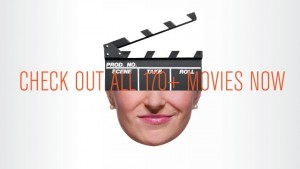 Writer-director Thom Southerland’s black-and-white drama, which is getting its Southeast premiere at the festival, focuses like a laser on amateur playwright Krasimira Stanimirova (co-writer Katerina Stoykova-Klemer), who travels to Lexington, Kentucky, from her home in Bulgaria after winning second place in an international writing contest, to see her play performed. But when she gets there, she finds that the community-theater troupe has little time for her.
Writer-director Thom Southerland’s black-and-white drama, which is getting its Southeast premiere at the festival, focuses like a laser on amateur playwright Krasimira Stanimirova (co-writer Katerina Stoykova-Klemer), who travels to Lexington, Kentucky, from her home in Bulgaria after winning second place in an international writing contest, to see her play performed. But when she gets there, she finds that the community-theater troupe has little time for her.
“I didn’t know traveling would be so lonely,” she says to herself in Bulgarian-language voiceover. “I keep waiting for people to appear and yell ‘surprise’ at me, or at least ‘Welcome to Kentucky, genius playwright.’” Instead, she wanders the streets, tours horse farms and befriends a single mom who invites her into her home and, preposterously, gives her complete control over her young child while she spends the night with an old boyfriend.
Thanks to a promising premise and an interesting autobiographical, even extemporaneous, feel, Proud Citizen has its heart in the right place as it tries to offer unique commentaries on unmet expectations and cultural differences. But like Krasimira’s American Dream, the film never quite congeals.
Welcome to Me, 2015, 1 ½ stars
Kristen Wiig’s colossal comedic break, Welcome to Me, is her chance to show whether she can carry a star-studded film virtually by herself and whether her nice turn in The Skeleton Twins was a fluke or a sign of better things to come. Regrettably, she disappoints on both counts. But, in a departure from the film’s title, the failure is not all about her, as she has considerable help from the writer and director and her fellow cast members.
 Wiig plays Alice Klieg, a bi-polar lottery winner who decides to eschew charity or any practical uses of her $86 million winnings and instead embrace fame full-force by launching a talk show hosted by and about only herself. Even Donald Trump must be offended by the immodesty.
Wiig plays Alice Klieg, a bi-polar lottery winner who decides to eschew charity or any practical uses of her $86 million winnings and instead embrace fame full-force by launching a talk show hosted by and about only herself. Even Donald Trump must be offended by the immodesty.
Accompanying Alice on her misadventure is the show’s director (Joan Cusack), producer (James Marsden) and production assistant (Jennifer Jason Leigh). The only ones who seem concerned for her well-being are her love interest (Wes Bentley), best friend (Linda Cardellini) and therapist (an underused Tim Robbins). But it’s not genuine concern, as little in this films rings true.
Thanks to underwhelming writing by Eliot Laurence, limp directing by Shira Piven and a mediocre performance by Wiig – who settles too comfortably into her low-key, deadpan, SNL delivery – nothing crackles the way it should in this inelegant, inarticulate and often unfunny take on our media-obsessed, selfish society. And just when you think the movie is about to make a larger, darker statement about redemption and the moral bankruptcy of fame, it pulls its punches, unable to rise above its implausibilities and contrivances. (Since when do “narrative infomercials” air live and unrehearsed, with virtually no one in the studio audience?)
It’s tough to select an opening-night film. Organizers must consider the tastes of its audience, the need to create a good feeling among its patrons, and the delicate balance between pushing the envelope and playing it too safe. They also have to consider what films are available and whether those films have enough buzz to sell tickets. Admittedly, this movie might partially satisfy on those levels, as I heard a few mutterings of “OK” and “cute” from those leaving the advance screening. But even more importantly, the opener must challenge us and set the proper tone for the remaining nine days of the festival. Welcome to Me does neither.
The best part about opening night (other than the cool party at Enzian and Eden Bar) is the stop-motion short (directed by Adam Pesapane, better known as PES) that will precede Welcome to Me. Though Submarine Sandwich (3 stars), in its North American premiere, is not as instantly mesmerizing as the director’s Oscar-nominated Fresh Guacamole from 2012, it’s a slice – literally – of cultural and culinary nostalgia.
Across the Sea FL, 2015, 1 ½ stars
Across the Sea, an unrelentingly depressing, though well-acted, drama in both Turkish and English, is a story of painful regret. It’s filled with moody, music-filled, handheld shots of contemplative characters walking the beach or strolling city streets – and almost nothing else, at least until the final emotional minutes.
Directors Nisan Dag and Esra Saydam try to overwhelm us with atmospheric longing and thereby create a movie that is greater than the sum of its parts. Perhaps they want to bathe us in the light of lost love and conjure up an image of Jay Gatsby, transfixed by the metaphorical light at the end of Daisy’s dock. But the only light here is the green one that this film should not have gotten.
The Tribe, 2014, 1 ¼ stars
Because of the single showing and lack of press screening, I was unable to review this film myself. However, I was quoted in a local blog as calling it a “pretentious, failed experimented.” I was quoted accurately. (But please keep in mind my rating does not apply to audience members who speak Russian sign language.)
Body, 2015, 1 ¼ stars
To say a film is bad is one thing; to say it’s unnecessary may be an even deeper cut. Yet that’s the word that comes to mind when watching Body, a wanna-be Hitchcockian thriller that, despite nice pacing and a refreshingly no-nonsense structure, feels unoriginal and tiresome from the get-go, relying too much on its score to deliver chills.
Growing wearing of their pot smoking, three 20-something valley-girl types are seeking fun on Christmas Eve. Their quest leads them to a deserted mansion that two of the women believe is the abode of the third woman’s wealthy uncle. When they learn the truth, it’s too late, and predictable trouble ensues, leading to, of course, bloodshed and in-fighting.
To successfully use the “innocent everyman in trouble” formula that the master of suspense perfected, the innocents in question must be, well, innocent. Even more importantly, they must be somewhat likeable and in a predicament that seems plausible. But after a healthy dose of unbelievability, a fairly large plot hole and such classic Hitchcock lines as “This place is fucking sick” and “Christmas is fucking awesome,” it matters little that first-time writer-directors Dan Berk and Robert Olsen actually have some interesting things to say about morality and decision-making in a time of crisis.
“What was it like, him dying? Was it fast?” one girl ponders. “Yeah, it just sort of happened,” another responds. If only the death of this film could have been as quick.
International Shorts Program
Most people think designing a shorts program begins and ends with picking the films. And then there’s Matthew Curtis, the programming director of the Enzian Theater and the Florida Film Festival. A consummate professional, he starts by picking shorts that complement one another and ends by massaging the order until it feels just right. The longest short is usually at the end, the tone is carefully balanced, and the program doesn’t begin or end too jarringly. He doesn’t always get it correct, but when he does, the programs are a pleasure to watch – helped in no small measure by the almost equally talented programming coordinator, Clementine Leger.
 With that said, a shorts program is only as good as its films, and the International Shorts program is usually one of the festival’s better blocks. This year’s seems fairly strong once again. If I were to give the overall program a star rating, it would flirt with a 4 before settling in at a solid 3 on our 0-5 scale. And at 98 minutes, and with a healthy mix of English- and foreign-language choices and comedy and drama, it’s a nice watch. (Remember, these are all live action. For animated, choose the International Animated block. And don’t forget the second block of live-action international shorts, consisting of four longer flicks.)
With that said, a shorts program is only as good as its films, and the International Shorts program is usually one of the festival’s better blocks. This year’s seems fairly strong once again. If I were to give the overall program a star rating, it would flirt with a 4 before settling in at a solid 3 on our 0-5 scale. And at 98 minutes, and with a healthy mix of English- and foreign-language choices and comedy and drama, it’s a nice watch. (Remember, these are all live action. For animated, choose the International Animated block. And don’t forget the second block of live-action international shorts, consisting of four longer flicks.)
Now let’s take a closer look at the 10 films and – to paraphrase Steve Martin – get reeeaally short.
The micro-short Don’t Eat the Meatball (2 stars) brings the block to a crisp, hilarious beginning. Nothing more than an adorable dog desperately resisting the urge to eat a ball of beef, it’s pure cinematic irresistibility until it ends abruptly with an overly cute, end-credit photo montage. Sigh. It could have been just a tad meatier.
That comedic substance is provided by the second offering, Makeover (3 stars), which showcases, in cartoonish fashion, an elderly man’s attempt at a Benjamin Button-style redo with nothing more than items found around the house. After some painful nips and tucks, he’s ready for his date with a youthful goddess, or is he?
In Bad Hunter (3 stars), a young man in Kurdistan comes to the aid of a woman who has been sexually assaulted, only to have the awkward situation come back to haunt them both in an unpredictable way. Directed by Sahim Omar Kalifa, this 15-minute drama is the second best of the program and offers a strangely intriguing commentary on both gender inequality and kindness in a country whose values might be more similar to ours than we had thought.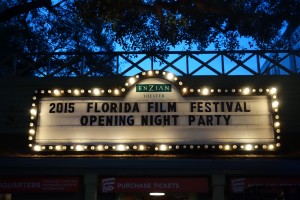
In the one programming slip-up of the block, Bad Hunter is followed by the worst short, the German-language Happy B-Day (1 star), which starts well but doesn’t capitalize on is slick cinematography and originality. It simply doesn’t know how to end and seems unsure whether it wants to be a dark comedy or a laugh-out-loud tribute to Monty Python’s Black Knight. Ultimately, it’s neither. But, hey, our rating system does allow 0 stars, so it could have been worse.
Belying its title, Pop-Up Porno F4M (3 stars) is a quirky and touching, though slight, story of a breast cancer survivor’s experiences with a new potential boyfriend. Told through the turning pages of a crudely drawn pop-up book, Stephen Dunn’s film saves its darkly funny yet slightly sad punchline for the very end.
In an Egyptian-run grocery in Switzerland, trouble begins after a woman misinterprets a father’s reprimand of his child. A melee ensues – fueled by confusion and racial biases – until the young girl seems the only remnant of sanity. Discipline (3 stars) is not terribly weighty, but it’s a nice comedic addition to the program thanks to its solid acting, brisk pacing and social commentary.
With four solid shorts under its belt, the program at this point feels ready to bust out with something excellent, and it does just that with Flash (4 stars), an inspired reimagining of the typical photo-booth experience. Embracing the genre of mystical romance, Alberto Ruiz Rojo’s dialogue-free film, at just 7 minutes, gives the block that healthy dose of surrealism I’d been hoping for.
Coming back down to earth slightly, we get Thicker Than Water (3 stars), which is no less original than Flash but just not as tightly edited or magical. Seung Yeob Lee’s Korean-language film is probably unlike any other vampire film you’ve seen, offering the themes of alienation, discrimination, love and sacrifice instead of violence, camp and those pale dudes who sparkle while spouting nonsense from badly written screenplays.
The originality keeps on coming, though in a slightly small dose, with Russian Roulette (3 stars), which focuses on two lonely video-chat daters – one who just happens to be in outer space. A sweet though overly simple look at loneliness, Ben Aston’s 5-minute film gets the most credit for its erotically amusing ending.
At 24 minutes, the Dutch-language Wien for Life (2 stars) is the longest film in the program. (Remember the aforementioned Curtis formula?) I can’t question its placement, but, unfortunately, this film wouldn’t quite work in any position. Tedious and tonally flawed, Alidor Dolfing’s tale of friends fighting over a winning lottery ticket strives for dark comedy but instead seems more like an uninspired, though well-acted, dramatic medication on selfishness and bad decision-making. Just like the doomed characters, the director and writer needed slightly better luck.
Though the material here won’t shock most adult audiences – Midnight Shorts this is not – the adult themes and mild violence means you’ll need to leave the kids at home. This program plays on April 17 at 6:30 p.m. at Regal Winter Park Village and again on April 19 at 1:30 p.m. at the Enzian.
Shorts Program #1: “All I Have to Do is Dream”
We’re approaching the halfway point of the festival, and if you haven’t caught a shorts program yet, shame on you. As I’ve said repeatedly, they are the Corpse Flowers of the festival, blooming infrequently and requiring your rapt attention lest you never see them again. Regrettably, shorts too can smell like decomposing flesh once in a while, but I’m happy to report that I’ve encountered a few more sweet smells than stinkers this year.
That botanical metaphor brings us to Shorts Program #1, which, like the other three live-action domestic groupings, is named for an Everly Brothers song, to honor Phil Everly, who died last year. “All I Have to Do is Dream” is the name of this one, and, indeed, several of the offerings in this block focus on dreams of one sort or another.
Michael Goode’s The Answers (4 stars on our 0-5 scale) starts the program perfectly. Shot well and immediately mesmerizing, this portrait of a man reliving his life just after death balances comedy, drama and romance in a way seldom seen in short cinema.
That’s a tough act to follow, but the understated, subtle and strangely effective Stuckey, Private First Class (3 stars), directed by Brantley Jones and getting its world premiere here, is almost up to the task. That’s more than I can say for Election Night (2 stars), which is bound to be a crowd pleaser – thanks in part to the appearance of Peri Gilpin (Roz from Frasier) – but is simply too contrived, despite the twist ending that I’m embarrassed to say I didn’t see coming.
Dad’s Dead and Mulignans (both 2 stars) are next and couldn’t be more different. The first is a single-scene drama between characters addressing not just the recent passing of their father but their own mental health. Though the acting is solid and the simple structure refreshing, it ultimately becomes more of an actorly exercise than a complete film. Mulignans, though a comedy, suffers the same fate: tedium. But, hey, you have to admire its unique take on race.
For Ofelia (3 stars), a dramedy set in the Philippines in the 1960s, is a weighty, almost haunting addition to the program. An odd Tagalog-language tale of a young boy whose mother dresses him like a girl, the film, directed by Christopher De Las Alas, is especially memorable once you realize it’s likely inspired by true events.
The penultimate offering is Smut (2 stars), a quirky coming-of-age tale by director Tom Sveen. Though it has its comedic sensibilities in the right place and, like Election Night, will likely be a crowd pleaser, it’s a tad too familiar and rough around the edges to make much of an impact.
Run Fast (4 stars) rounds out the block in spectacular fashion and is, along with Rabbit (Shorts Program #3), one of the two must-see festival shorts I’ve seen so far. Directed by Anna Musso and starring Robert Forster in an irresistibly crusty role, it’s the story of a poor Kenyan runner balancing her desire to win a Los Angeles marathon and her responsibilities back in her home country. Slow to start, the film will creep up on you and deliver an emotional punch at the finish line.
Shorts Program #1 has its second and final screening Tuesday, April 14, at 6:30 p.m., at Regal Winter Park Village.
Miscellaneous Shorts
The shorts are often the most rewarding watches, and this year’s festival is packed with 120 of them. While you probably shouldn’t choose a program based on a review of just one film in that block, I nevertheless present some brief critiques – from worst to best – of the shorts I’ve seen.
In Haze (1 star, part of Shorts Program #4), a young man tries to find out what really happened during a one-night stand. When he discovers the truth, it sure would be nice if he’d fill us in, because without that information, this technically well-made drama seems pointless, except to posit a vague idea about the perception of date rape.
A North Korean general is torn between his obedience to his country’s oppressive regime and his daughter’s desire to attend music school in the United States in The Loyalist (3 stars, part of Shorts Program #3), an emotionally charged, politically tinged melodrama.
At 23 minutes, the documentary Unmappable (4 stars, part of the 8X Very, Very Real Doc Shorts Showcase) feels too short, but, through stylistic glimpses into the both the actions and psyche of its unique subject, it nevertheless paints a memorable portrait of Denis Wood, who, for good and bad, doesn’t see the world the way most of us do. Raised by an anarchist father and believing that “laws are horrible things, by and large,” Wood doesn’t draw inside the lines. That applies both to his maps, which blur the distinction between cartography and art, and his personal indiscretions, which led to his incarceration for having a sexual relationship with a 16-year-old boy.
A uniquely touching drama about the role animals play in psychotherapy, Laure de Clermont-Tonnerre’s Rabbit (4 stars, part of Shorts Program #3) also serves as a darkly smart commentary on the similarities between animal and human captivity. It’s one of the must-sees of the festival.
Epilogue
 The 10-day-long Florida Film Festival ended on April 19 with the closing-night film, a 50th-anniversary restoration of Jean-Luc Godard’s Alphaville, at 9:30 p.m. at Enzian Theater. Kumiko, the Treasure Hunter, one of the best films of the festival, also had its final showing, at 9 p.m. at Regal Winter Park Village.
The 10-day-long Florida Film Festival ended on April 19 with the closing-night film, a 50th-anniversary restoration of Jean-Luc Godard’s Alphaville, at 9:30 p.m. at Enzian Theater. Kumiko, the Treasure Hunter, one of the best films of the festival, also had its final showing, at 9 p.m. at Regal Winter Park Village.
The awards bash was held April 18 at Enzian, and Imperial Dreams walked away the big winner, taking home the Audience Award and the Grand Jury prize for best narrative feature. Tomorrow We Disappear won the Grand Jury prize for best documentary feature while Limited Partnership won the documentary Audience Award.
Among shorts, Unmappable won for best documentary, Myrna the Monster won for best live-action, and The Pride of Strathmoor took home the prize for best animation. The Audience Award went to The Gunfighter. The Florida Film Festival is an Oscar-accredited festival, which means the live-action and animation jury winners are now potentially eligible for an Academy Award nomination.
The judges created three special awards this year. For “special innovation in [short film] storytelling,” For Ofelia took home an award. For “nonfiction storytelling,” Welcome to Leith received recognition. And Katerine Stoykova-Klemer of Proud Citizen won for “outstanding debut performance.”
Keep in mind not all films were eligible for awards, as many, such as Spotlight films, were screened out of competition.
The event was hosted by Peg O’Keef in full mermaid costume, and guests were treated to music on the Enzian lawn by The Legendary JCs and a hysterical, seemingly impromptu bit of musical madness by Bené (Bennett Jones), the star of I Am a Knife With Legs.
The festival was generally well received this year, with the only drawback being the weather, which forced the cancellations of all three outdoor films at the Enzian and even the shuffling of venues at Regal Winter Park Village thanks to a leaky ceiling.
© 2015 MeierMovies, LLC / Orlando Weekly
![Sam Rockwell[1]](https://www.meiermovies.com/wp-content/uploads/2015/04/Sam-Rockwell1-225x300.jpg)


